Market Dominance Guys
Belief in the Meeting
Episodes
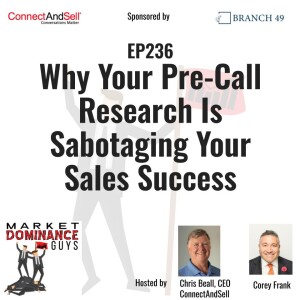
Wednesday Aug 07, 2024
EP236: Why Your Pre-Call Research is Sabotaging Your Sales Success
Wednesday Aug 07, 2024
Wednesday Aug 07, 2024
In this episode of Market Dominance Guys, Chris Beall challenges conventional wisdom about pre-call research in cold calling. Drawing from a recent real-world experience, Chris dives deep into the mathematics and psychology behind sales conversations.
Is extensive research before each call truly beneficial, or could it hinder your team's effectiveness? Chris presents a compelling case that might surprise even seasoned sales professionals. He explores the delicate balance between being informed and being presumptuous and how this impacts your prospects' crucial emotional journey.
Whether you're a sales trainer, leader, or CSO, this episode offers fresh insights that could revolutionize your approach to cold calling and discovery meetings. Chris breaks down the true goals of these interactions and provides a framework for achieving them more efficiently.
Prepare to challenge your assumptions and discover a potentially game-changing perspective on pre-call research and sales strategy.
Here is the math from this episode:
Conversation Statistics for Chris' Team That Day:
Total conversations: 438
Total meetings set: 30
Total dials: 12,522
Dial-to-connect ratio: 28.59 dials per conversation (12,522 / 438)
Average conversation length: 78 seconds
Research Time vs Conversation Time: Let R = research time per dial attempt Let C = average conversation time Let D = dials per conversation
Research time per conversation = R * D Conversation time = C
Equation: R * D : C
Using the numbers provided: 3 minutes * 28.59 : 78 seconds 180 seconds * 28.59 : 78 seconds 5,146.2 seconds: 78 seconds
This simplifies to approximately 66 seconds of research to achieve 1 second of conversation
Chris rounds this to 90 minutes (5,400 seconds) of research to achieve 78 seconds of conversation
Research to Conversation Ratio: Research time : Conversation time = 5,400 : 78 Simplified ratio ≈ 69 : 1
This means for every 69 seconds spent on research, only 1 second is spent in actual conversation.
Efficiency Calculation: If a rep makes 60 dials per day: 60 dials / 28.59 dials per conversation ≈ 2.1 conversations per day
Actual performance: 438 conversations / 22 reps ≈ 19.91 conversations per rep per day
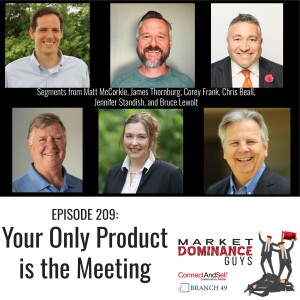
Wednesday Jan 10, 2024
EP209: Your Only Product Is the Meeting
Wednesday Jan 10, 2024
Wednesday Jan 10, 2024
Closing sales requires trust, and trust is built through conversation. As Chris Beall notes, in B2B, the gateway to ongoing dialogue is the discovery meeting. Yet, too often, sales teams fail to view the meeting itself as the product they are selling. As Bruce Lewolt highlights, sellers must frame their sincere care for the customer’s success. This care is best conveyed interpersonally. By securing that initial meeting, the sales rep opens the door to relationship-building. As Jennifer Standish explains, delivery matters as much as content in piquing interest. With the right tonality and empathy, a seller can turn cold calls into warm introductions. James Thornburg and Matt McCorkle build on this idea: the meeting is a gift, saving the prospect time and money. When sellers view appointment-setting as customer service, their conviction carries through. The discovery meeting enables the sales conversation to continue. Building trust starts with booking that first meeting. Join us for episode 209: Your Only Product Is the Meeting.
This episode has segments from the following full episodes featuring Matt McCorkle, James Thornburg, Corey Frank, Chris Beall, Jennifer Standish, and Bruce Lewolt.
EP139: Your Product Is the Meeting
EP122: Learning to Manage Your Voice Under Pressure
EP115: The Enemy of Your Message Is Drift
EP113: The Cold-Call Kiss of Death
EP108: Sales and the State of Apprehension
FULL EPISODE TRANSCRIPT Below:
Chris Beall (00:00):
I think that's what we do primarily in sales is we help people go from the emotional state they're in to one that would be more conducive to getting to an exploration of possibilities. And when we think of it differently, I think we get in trouble.
Matt McCorkle (00:16):
Yeah, I really like that analogy of being on the phone with somebody and the value of the meeting is saving them from an oncoming train or a bus or whatever you're saying. What we say is that this one isn't nearly as impactful, but when we're training we say you are giving the person you're talking to a hundred dollars, are you going to be excited and happy to give this person a hundred dollars because you're saving them that money simply by showing up and showing them some of the knowledge that we have at Ksr for their operation. Absolutely. You're not taking a hundred bucks from them. You're not wasting their time. You're giving them a hundred dollars and here's the a hundred dollars of value you're giving them. That's when we use, pretend like you got a hundred dollars and you're pocket and you're just walking up to somebody to say, here you go. No strings attached. Here's a hundred bucks. Help with that confidence. Absolutely right. Corey,
Corey Frank (01:09):
What's more fun for you? Do you have a balance of how often do you do cold calls? How often do you do discovery and do you yearn for doing one over the other?
James Thornburg (01:19):
I'm enjoying it all. To be frank. Right now I have a great process. I make calls maybe like an hour, an hour and a half a day, typically four or five days a week, pretty much every day, anywhere between nine and 11. And then in the afternoon it's dedicated to meetings. And depending on the day, I may be running two or seven different meetings. They might be net new meetings, they may be follow-ups, things of that nature. And then what people don't get to see, and it's kind of hard to understand is there's a whole world of selling and working deals behind the scenes with the different providers in terms of registration and things of that nature. Competitors, I mean, it's a knife fight. And what people don't realize about this business is that these deals don't always go through the front door. Traditionally how people expect them to be. I mean there's a lot of maneuvering on opportunities to get things done.
Corey Frank (02:10):
How about from a metrics perspective, James? I think Chris, at any given time you give him seven seconds notice. He'll pull up the data and the stats for his team and know within the first hour of the day if they're off or who needs help on the intro, who needs help on tonality as kind of the proprietor of your own practice there. Do you look at the stats at that level of tactical detail of how you're doing 'em one day or to the other and dial the connect or dialed a meeting or if you're getting your butt kicked in the intro, maybe it's a tonality thing and I should probably change it up. How do you use math of the data to alter or calibrate your sales process?
James Thornburg (02:51):
I do have a general idea in terms of what my numbers look like. I don't get overly concerned about, Hey, what my conversions are down this month. I just think it's a trend. I mean, you look at, last week for me, I set five meetings like an hour and a half, never happened before. This week I'm at one meeting, one meeting probably 20 conversations. So it's not horrible but not great. And so it flows. It flows and some days I'm better than others. I can feel it. You just know the conversations or I'm catching the right people. But I have a good idea in terms of my conversions, I mean, well data connect's kind of irrelevant I guess right now, but do connect was trending at probably close to three and a half, probably three and a half percent. But my conversions on my conversations are right around 10 out of 10 people I talk to. I'm converting one of those.
Chris Beall (03:45):
The disease that kills companies is distraction. That's why little companies shouldn't do strategic partnerships with other little companies that give each other the disease called distraction. And it's highly communicable, so be careful of it. You need focus and the focus is starts with the list. It's really easy to stay focused when you have that list. You can go through the list and say, have we talked to everybody on this list? We haven't. Let's take the ones we haven't talked with and try to talk to them. Okay, if somebody wants help doing that, come to me. I can help you talk to a whole bunch of people. That's what we do is like talk to folks and we help you talk to people. Have we got a meeting with everybody on the list? Not yet. Well, we have a job to get a meeting with the rest. Have we learned from the meetings that we've had, what resonates? So what percentage are resonating on the economics, what on the emotional and what on the strategic and what didn't resonate at all? That's a little trickier, but it's very objective step by step by step, and by going step by step, we do take care of immediate needs because guess what? We'll actually be closing business sooner than not. And the best part is it keeps getting easier instead of getting harder. That's the reason you do this.
Jennifer Standish (05:06):
I also think that we have to accept that a certain percentage of the population doesn't like to be sold to and they will shut down meetings to their own detriment. But there's nothing you can say to them. They just will not be sold to. And we just have to accept that. But everybody else is someone willing. Some people are more willing than others. I've had situations where I get no objection. I get sure, I'd love to. Absolutely. I'm available on this particular date and time and it's super easy. Other times there's a little bit of pushback, but then people are amenable. It's to scheduling appointments. So we just have to accept that some people are more willing to meet with people and are interested in what people have to
Corey Frank (05:52):
See. Jen, how much of that do you think, and you've seen, you've probably experienced bad calls. You've probably from your background, taught many folks to learn this skill. You have a voice. We have a handful of folks on this podcast, all brilliant folks, of course, present company included with me and Chris. But a lot of the folks that are on these podcasts of ours, they have a voice that can just melt butter and they have a command of their tonality, their stammer, their pregnant pauses. Is that something that you see as correlating to your success? Yes.
Jennifer Standish (06:29):
When you're, and I'll tell you, trainers, cold calling trainers, do not spend enough time working with people on their delivery because it's 80% of your success as a cold caller. A great script hits all the points with a terrible delivery. We'll get no appointments, but a great delivery with a mediocre script, we'll still get you appointments. Absolutely.
Bruce Lewolt (06:58):
So there's the athletic, the endurance, taking the brunt of rejection and still coming back strong. There is also, and to Corey's point at the sincerity, I really care about helping students. If you're a corporation, I really care about helping salespeople reach their full potential and do well. I care about helping your business do well. So that comes through to me. But when I train salespeople, I recognize if they work for a big electronics company, they may or may not care as deeply as I do about their customer doing things. So my daughter was a successful actress when she was young in Hollywood. She was on a lot of national shows and a lot of acting, trading, and they use framing, what's my frame here? How am I looking at the world? So for the salesperson, before they start, they need to do the same exercises that an actor does beforehand to get themselves in the right frame seeing things in the right frame. So they are coming across as caring. They are coming across if need be as very confident, or they are coming across as, I'm struggling a little here, could you help me? The broken wing script, if that's what they're doing.
Chris Beall (08:13):
Well, one of the beauties of B2B is that B2B tends to run through a meeting. You're going to have a meeting, and the meeting is a meeting in which both people are going to voluntarily show up. And the fear that's expressed as annoyance, it's going to be replaced by apprehension that you can replace with some other emotion. And it's a lot easier to work with apprehension on a volunteer than it is to work with fear on somebody you've ambushed. It's an easier emotional sort of game to play when we're dealing with that more awkward conversation. The cold conversation. One of the beauties is, the only thing you have to believe in deeply and sincerely, is the potential value of the meeting for the human being you're talking to in the case where you're never going to do business with them, and this is the only time in business.
(09:03):
I think there's such a thing as a universal framing. You can deeply believe no matter what you're selling, you can deeply believe my company are experts at this because we're specialists and this other person is a generalist and can learn from us. And what strikes me as especially odd is the product training that goes on for salespeople, even those who are setting meetings, is not about the product that they're selling, which is the meeting. So they never learn about that product, which is the only product that they have to sell and be sincerely to have that sincere belief in its value. And it's so odd. I have yet to see one time across all of B2B that I've run into, and you guys know, I see a little bit of it. I've never had a yes answer to this. So can you break down the discovery meeting for me that this person's going to have? Who says yes in terms of the value that they're likely to receive from attending that meeting?
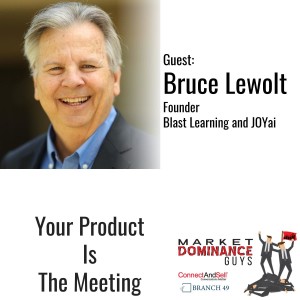
Tuesday Jul 05, 2022
EP139: Your Product Is the Meeting
Tuesday Jul 05, 2022
Tuesday Jul 05, 2022
How many cold-call opportunities have you wasted by pushing hard and fast to sell your company’s product? Today’s podcast guest, Bruce Lewolt, Founder of both JoyAI and Blast Learning, talks about a more caring and effective approach to selling. It starts with switching the goal of that initial call from selling your company’s product to offering prospects a helping hand with a problem or goal they have. Imagine for a moment you’re the prospect, and you’ve just been ambushed by a cold call: Who would you be willing to set an appointment with for a discovery meeting? A person blatantly trying to make a sale? Or a caring professional who understands your business’ needs and wants? In this episode, our three well-reasoned and insightful sales professionals share many insights with our listeners about making a successful cold call, but the one you don’t want to miss is this “aha!” moment. Your job is not selling your company’s product: Your job is selling a discovery meeting. That should make the title of this week’s Market Dominance Guys’ podcast very clear: You’re still selling something, but “Your Product Is the Meeting.”
Listen to Bruce Lewolt's previous episodes in this series:
EP137: What Do Your Prospects Really Hear?
Ep138: Don’t Get Lost in Your Rock ’n’ Roll
More episodes on the topic of Believing in the Meeting are here.
About Our Guest
Bruce Lewolt is Founder of Blast Learning, a service that uses Alexa or Google Assistant as an intelligent personal study assistant, resulting in a state-of-the-art study method that is not just effective but makes learning enjoyable. (See BlastLearning.com and BlastStudy.com) He is also the Founder of JOYai, the first emotionally intelligent and sales-savvy artificial intelligence system for salespeople, bringing intelligent automation to prospecting and selling.
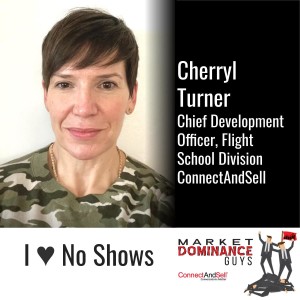
Wednesday Apr 07, 2021
EP76: I Heart No Shows.
Wednesday Apr 07, 2021
Wednesday Apr 07, 2021
On this week’s episode of Market Dominance Guy, Chris Beall continues his conversation with Cherryl Turner, Chief Development Officer of ConnectAndSell’s newest division, Flight School. Together they talk about why it is that of the four sales outcomes — Yes, No, Not me, or Not now — the response that dominates is “Not now.” As Chris explains, “It’s the nature of life.” People are busy. Things come up. Priorities shift. But when a prospect says, “Not now,” what’s a sales rep to do? Push harder and try to squeeze his pitch into the conversation anyway? Or should he relax and bow to the prospect’s protestations that it’s a bad time to talk, by graciously saying, “No problem. I’ll give you a call next week.” It’s an unusual reaction in the high-pressure world of “Make that sale,” but this may be one of the keys to Cherryl’s success in her career: as Chris says, she handles the rigors of cold calling with grace.
It also takes grace to handle the frustration of a no-show. But Chris’s surprising reaction to a cancelled appointment is, “I heart no-shows! They’re my favorite thing in business!” A no-show, he says, makes the relationship more real, because now it’s less perfect. It creates a more-even footing for the next conversation, as well as an opening for a prospect to reveal an insight or two about his business as he explains the why behind his missed appointment. So, when a rep or AE is faced with a no-show and is able to relax and say, “Hey, I understand. I’ll call you back later so we can find a time that will work better for you,” then that improves what Cherryl calls the “trust-o-meter.” She has learned that being persistent with call-backs to “Not now’s” and “No shows” lets her prospects know that she believes in the potential value of what she is selling. And you can believe me when I say, you’re going to want to hear every minute of this week’s episode of Market Dominance Guys, “I Heart No-Shows!”

Thursday Mar 18, 2021
EP73: You‘d Better Believe It
Thursday Mar 18, 2021
Thursday Mar 18, 2021
This week, our Market Dominance Guys, Chris and Corey, interview Matthew Forbes, Head of Strategic Accounts at ConnectAndSell, about an epiphany Matt had that increased the meetings he set by almost 400%. Wow! What could possibly change that would explain that kind of increase? Well, it’s actually a simple change, but it’s a very necessary one: Matt came to truly believe — deep in his soul — in the potential value of the discovery meeting for his prospects, even if they were never going to do business with ConnectAndSell. His messaging script didn’t change at all. It was his belief that did. Listen to today’s Market Dominance Guys episode, “You’d Better Believe It!” to learn how Matt came to make this meeting-setting leap.
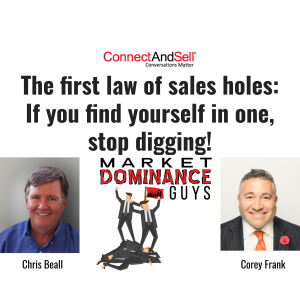
Thursday Feb 27, 2020
EP21: The First Law of Sales Holes - If You Find Yourself in One, Stop Digging.
Thursday Feb 27, 2020
Thursday Feb 27, 2020
The United States may stake its claim as the first country to land on the moon but Russia can boast that it is the first country to drill the 2nd deepest man-made hole ever recorded here on Earth.
Since the early 1960s, scientists have attempted to drill down to the Earth's mantle. Why the mantle? Because we’re told that scientists only have a "reasonable" understanding of what it's made from, and how it works.
In 1970, Russia entered the race to dig. But unlike the Moon landing, Russia achieved more than the US. Over the next 20 years, a Russian team of scientists drilled down 40,230 feet into the Earth… That's 7.6 miles. The hole, known as the "Kola superdeep borehole," is only nine inches in diameter. Nearby residents around the dig have said they could hear souls screaming in hell coming from the depths as the team dug deeper and deeper. Take advice from the Market Dominance Guys, if you find yourself in a sales hole, stop digging.
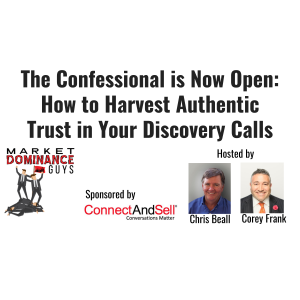
Wednesday Oct 30, 2019
EP9: How to Harvest Authentic Trust in your Discovery Calls
Wednesday Oct 30, 2019
Wednesday Oct 30, 2019
Ask 50 bartenders how to make the best Tom Collins and 48 out 50 will tell you: Pour 1 oz Freshly squeezed lemon juice, 1 1/2 oz Gin, 2 oz Carbonated water and 1/2 oz Sugar syrup and shake. Now ask 50 sales professionals how to “make” the best Discovery call and you’ll get 50 different answers. Have an agenda. Build rapport. Establish time frames. Set a power frame. Identify a budget upfront or don’t do the call at all. Do a question stack. Talk a lot. Talk a little. It seems that everyone has their own recipe, and yet they are still calling it by the same name. Now sales discovery calls have been around at least as long as the vaunted and debonair Tom Collins. So why do they differ so broadly, and what ARE the necessary ingredients for creating a great Discovery session? In this session of the Market Dominance Guys, I ask Chris – a master mixologist in his own right – for the best additives – including trust, tone, and pace to earn a true confession in a Discovery. This is “The Confessional is Now Open – How to Harvest Authentic Trust in your Discovery Calls”

Tuesday Oct 15, 2019
EP7: Don‘t Make the Spiders Angry
Tuesday Oct 15, 2019
Tuesday Oct 15, 2019
There is a universal product that every company has that it needs to better understand and sell more effectively and correctly. And it's a product that can be crafted and messaged just like any other product your team sells. Because it’s a real product, it requires belief in its potential value and worth from the folks that sell it. It’s a product that shouldn’t be short-cut or mis-messaged…or even try to do too much. It needs to be measured for effectiveness. And the ability to get this product in front of your list is also one of the keys to market dominance. That product is the Discovery Meeting or Discovery Call. In the episode, I ask Chris to separate fact from fiction and put some sound data and reasoning behind this misunderstood and much-maligned tool. This episode of Market Dominance Guys is The Right Tool for the Right Job, or as I like to call it, Don’t Make the Spiders Angry.